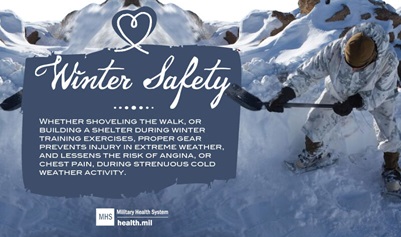Dear Doc: I can’t speak for everyone, but I know where I live, we’ve still got a month or so of extreme cold weather left. Following the advice from your last column, I’m pushing through with my outdoor workouts. While I am staying warm, I’ve noticed that I get tired quicker than I would when it’s warm outside. I’ve also heard that your heart must work harder when you’re working out outside during the winter. How can I make sure I’m not risking my heart health to keep up my routine?
–-Trying to be Heart Smart

Dear Heart Smart: You’re exactly right! Cold weather can cause blood vessels and arteries to constrict, making the heart work harder to pump blood. If you’re experiencing chest pain, it may even be angina and you should seek medical attention, especially if it spreads to your shoulders, arms, or neck. Many people don’t realize that even things like shoveling snow should be approached with caution at this time of year.
It’s very easy to forget to listen to your body when all you can think about is how darn cold it is. I talked to Navy Lt. Victoria Selkirk, a board-certified sports dietician with expertise in how the body reacts to different stressors. She just got first-hand experience on how cold weather affects the heart after enduring winter training at the Marine Corps Mountain Warfare Training Center near Bridgeport, California.
Selkirk explained that, although she’s not a cardiologist, her experience with heart health stems from counseling people on cardiovascular nutrition, especially those experiencing congestive heart failure or cholesterol issues.
The main thing that you want to think about when you’re working out or working in cold weather, and the way that it impacts your cardiovascular system, is that blood vessels, like everything else, constrict when you’re out in the cold, essentially because the heart is concentrating on pumping the blood to your brain and all your organs. That can be problematic.
Cold also increases the risk of developing blood clots, especially if that’s something an individual is prone to or if they’re taking any type of anticoagulant medication. That’s something they need to think about and talk with their physician about to make sure they’re not unduly exposing themselves to cold temperatures for a prolonged period. Blood clots can lead to heart attacks or strokes. If the blood vessels are constricted/smaller, it’s easier for the blood to clot. That’s a recipe for disaster for a cardiovascular event.
Those are the main things we think about, systemically, when we’re talking about cold weather and the heart. It’s a matter of knowing if you have any pre-existing conditions, but also paying attention to the signals your body may be giving you that something may be off.
Even if you’re in good shape, a sudden temperature change is going to be a shock to your body, so it’s always a good idea to give your body time to adjust gradually, both when going out into the cold and when coming back inside afterwards.

When you’re exposed to a cold-weather environment, you’re focusing on the cold, so you’re somewhat distracted and maybe only focused on how uncomfortable you are. While you’re thinking about how cold your toes are or how your back may hurt from shoveling, for instance, you also need to pay attention to other signs like pain in your chest, arms or face, dizziness, or sweating.
All of this applies to any strenuous activity you may be doing outside in the cold: exercising, working, or training, AND any work you may be doing outside at home where you may be exerting yourself. Make sure to pay attention to hunger, thirst, and how you feel physically and mentally.
Heart Smart, I hope this helps! The bottom line is that you need to pay attention to the signals that your body is sending you, especially if you have a known history or pre-existing heart condition. February is, in fact, American Heart Month, but I encourage you to take the necessary steps to keep your heart healthy all year long.
Stay warm and, as always…take care out there!
–Doc